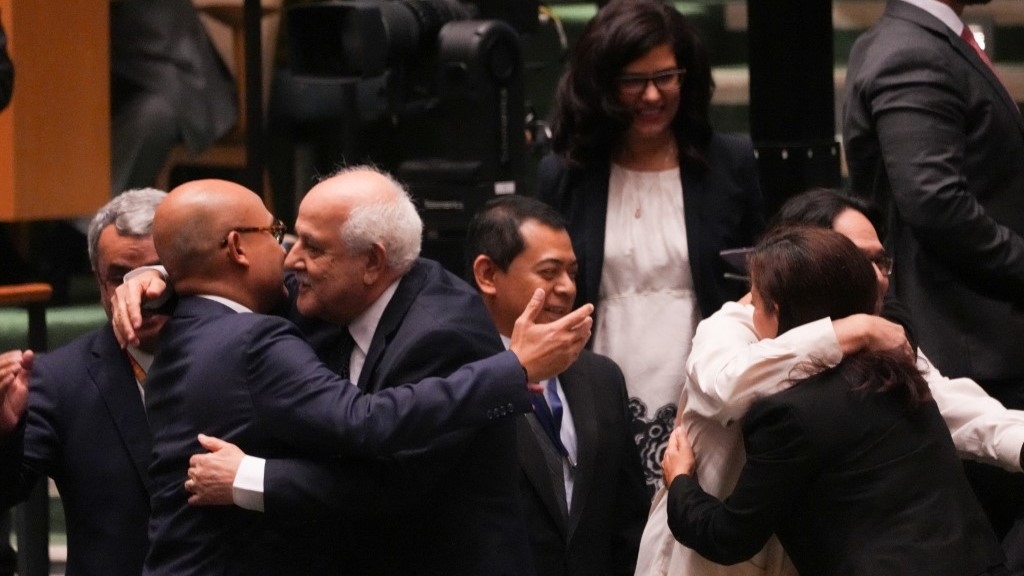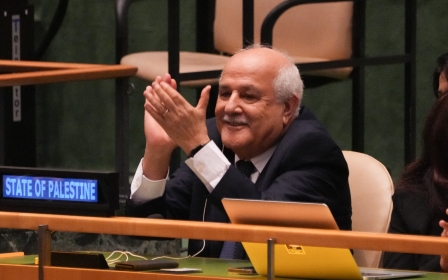UK abstention on UN vote 'marginalises it on world stage', say NGOs

The UK government has been criticised by British NGOs for abstaining on a UN resolution demanding that Israel end its "unlawful presence" in the occupied West Bank and the Gaza Strip within a year.
Britain was one of 43 countries to abstain on the resolution, alongside Australia, Canada, Germany, Ukraine and others. Only 14 countries, including Israel and the United States, voted against it - while 124 countries backed the resolution.
It also demanded the withdrawal of all Israeli forces and the removal of Israeli settlers from the occupied Palestinian territories.
Dr Sara Husseini, director of the British Palestinian Committee, told Middle East Eye that Britain's abstention "further marginalises it on the world stage when it comes to advancing justice in Palestine".
British charity Oxfam said the move was "profoundly disappointing", especially "coupled with the fact the UK is still supplying arms that Israel is using to kill civilians and maintain its occupation".
New MEE newsletter: Jerusalem Dispatch
Sign up to get the latest insights and analysis on Israel-Palestine, alongside Turkey Unpacked and other MEE newsletters
“This historic vote has shown that the international community overwhelmingly recognises its obligations in ensuring the Palestinian people’s right to self-determination and an immediate end to Israel’s illegal occupation of Palestinian territory," Oxfam said on Thursday.
"However, the UK’s decision to abstain from the vote does nothing to uphold the government’s claim to be among the 'defenders' of international law."
Tim Bierley, a campaigner at Global Justice Now, accused the government of showing "complete disregard for the ongoing suffering of Palestinians forced to live under military-enforced racial discrimination".
In 2023, the previous Conservative government agreed to oppose the use of "apartheid" to describe Israel's treatment of Palestinians as part of a new "strategic partnership" between the two countries.
Brtain also pledged to confront “anti-Israel bias” in international institutions, including at the United Nations’ Human Rights Council.
Closing all loopholes
Bierley called for Britain's dealings with Israel to "drastically change", including "closing all loopholes in its partial arms ban and revoking any trade or investment relations that might assist the occupation".
ActionAidUK said on Wednesday: "Regardless of how they may have voted today, states have an unequivocal duty to adhere to the court’s ruling. For the UK, that means going further than it has already and halting all arms export licences to the Israeli government immediately."
The vote was based on the July advisory opinion of the International Court of Justice (ICJ), which found that Israel's presence in the occupied Palestinian territories is unlawful and its settlement policy is in breach of the Geneva Conventions.
It further found that Israel's policies and practices in the occupied Palestinian territories amount to annexation of large parts of these territories, and that Israel systematically discriminates against the Palestinians who live there.
Middle East Eye delivers independent and unrivalled coverage and analysis of the Middle East, North Africa and beyond. To learn more about republishing this content and the associated fees, please fill out this form. More about MEE can be found here.




